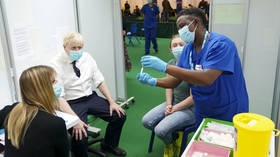New highly mutated Covid strain discovered

The new variant of Covid-19 was first discovered in a patient who returned to France from Cameroon. Researchers said it’s too early to assess the variant’s features.
The new strain, B.1.640.2, was detected in 12 patients living in the same geographical area in southeastern France, a team of scientists said in a preprint published online on medRxiv last week.
The strain is related to the B.1.640 lineage, which was classified as a variant under monitoring (VUM) by the World Health Organization (WHO) in November.
The first known patient was a vaccinated adult who returned to a French village from a trip to Cameroon and exhibited mild respiratory symptoms the day before the diagnosis.
Genome analysis revealed that the virus of this particular strain has 46 mutations, the researcher said. “It is too early to speculate on virological, epidemiological or clinical features of this… variant based on these 12 cases,” they wrote.
“Overall, these observations show once again the unpredictability of the emergence of new SARS-CoV-2 variants and their introduction from abroad, and they exemplify the difficulty to control such introduction and subsequent spread.”
Scientists around the world have been on high alert for new mutations of the coronavirus because they could produce variants that are more contagious and vaccine-resistant.
The emergence of the Omicron variant, classified as a variant of concern (VOC) by the WHO in November, prompted multiple countries to close their borders and tighten other pandemic-related restrictions.
“As this pandemic drags on, it’s possible that new variants could evade our countermeasures and become fully resistant to current vaccines or past infection, necessitating vaccine adaptations,” WHO Director General Tedros Adhanom Ghebreyesus warned last week.













